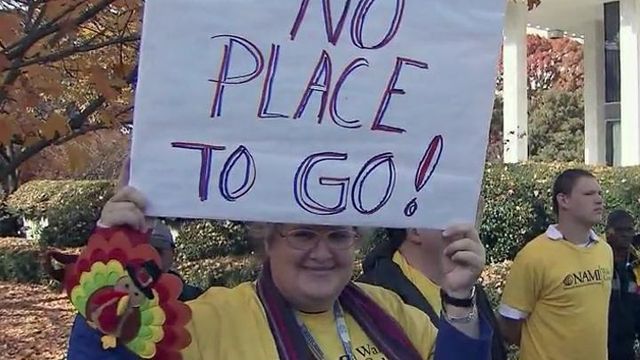Residents call on lawmakers to keep NC group homes open
Scores of disabled people who live in group homes rallied outside the Legislative Building on Wednesday, saying they will likely be on the streets in two months if lawmakers don't take action.
Posted — UpdatedChanting "save our homes," the group called on lawmakers to hold a special session in December to provide money for services to mentally ill and developmentally disabled people in group homes.
The state for years applied different standards for people to qualify for personal care services, depending on whether they lived at home or in an adult care facility. The services help disabled people with everyday activities, such as eating, bathing and getting dressed.
Federal regulators repeatedly demanded that the state apply the same standard for everyone, and a federal judge ruled last December that the state was violating the Americans with Disabilities Act and ordered a common standard to qualify for personal care services.
Choosing the lower standard used in adult care facilities could have cost North Carolina hundreds of millions of dollars, so the state chose the tougher standard that had been applied to people receiving personal care services at home. As a result, more than 11,000 disabled people in group or adult care homes will no longer qualify for the services through Medicaid as of Jan. 1 because the state considers them functional enough to live without them.
After adult care facilities said the cut to their Medicaid reimbursement income could put them out of business, lawmakers set aside about $40 million to help them transition. The money is earmarked for nursing homes or adult care facilities, leaving about 2,000 people in group homes statewide with no help.
"It's the end of the line. The only place to go now is to a shelter, and the shelters are full," said Ann Akland, of the Wake County chapter of the National Alliance on Mental Illness. "They can't survive out on the street without help. There has to be some solution."
The General Assembly doesn't return for its regular session until Jan. 30, so a special session would be needed to address the situation before the cuts kick in.
Rep. Nelson Dollar, who heads the House Appropriations and Health and Human Services committees, said Gov. Beverly Perdue's administration didn't fully inform lawmakers about the problem and should be responsible for fixing it.
"They can pull from other sources – the same place they just recently pulled $20 million (for pre-kindergarten programs) – and pull sufficient funds in so that they can cover these group homes," said Dollar, R-Wake.
The Perdue administration disputes Dollar's statement, saying Republican legislative leaders were fully informed. The administration cannot fix the problem because of budget constraints, a spokeswoman for Perdue said, so the governor is talking with lawmakers to try to find a solution.
Two subcommittees of a legislative panel looking at ways to overhaul North Carolina's mental health system met in Raleigh Wednesday, and some of the protesters spoke to the lawmakers about their situation.
Alexander Harrison said he has lived in group homes for nine years because his schizo-affective disorder requires 24-hour supervision. If the home closes and he's unable to get medication or care through Medicaid, he said he will likely become homeless.
"(Group homes are) very important to prevent homelessness, incarceration and living in the hospital," Harrison said.
• Credits
Copyright 2024 by Capitol Broadcasting Company. All rights reserved. This material may not be published, broadcast, rewritten or redistributed.






